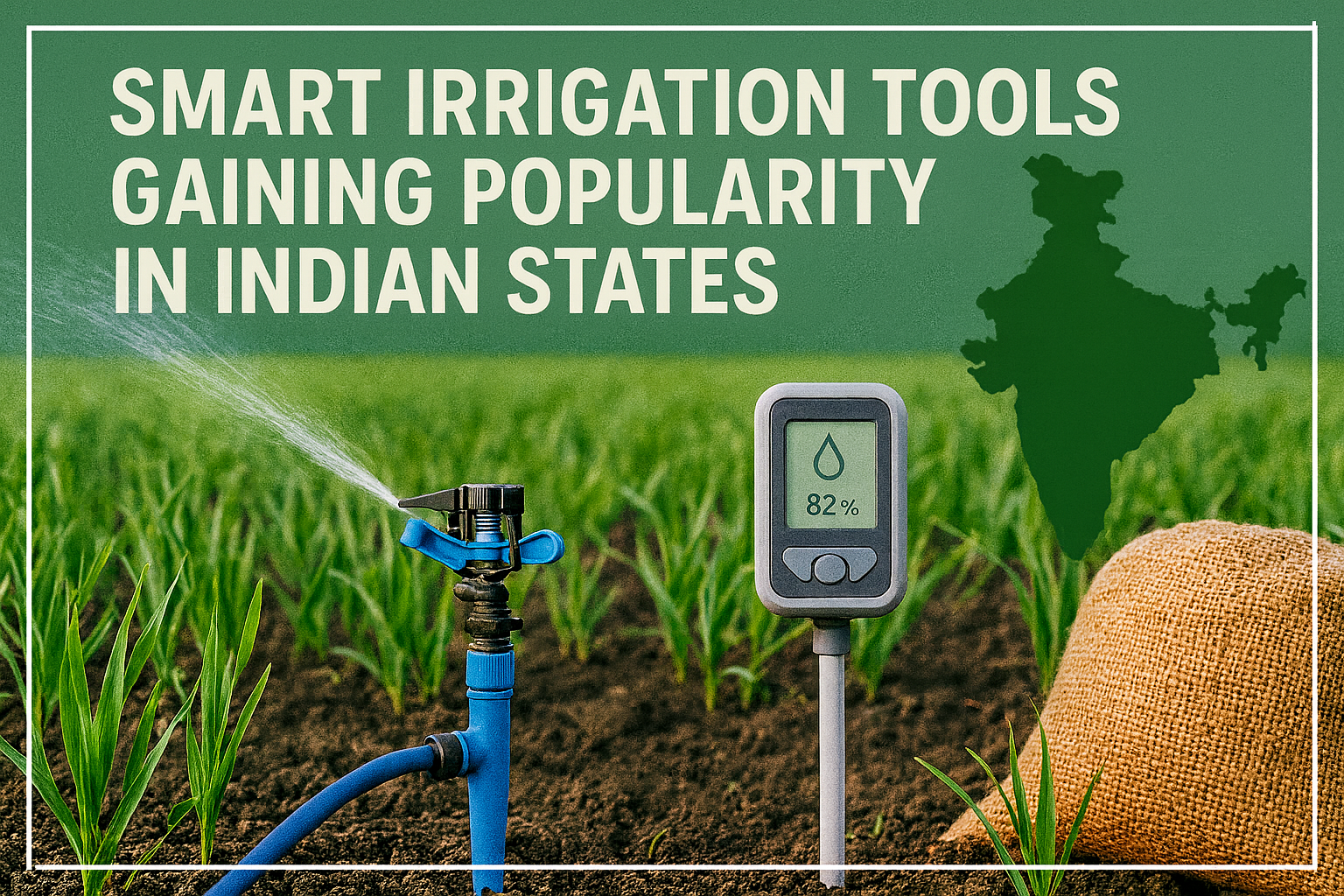
Smart Irrigation Tools Gaining Popularity in Indian States
Posted on November 24, 2025
Smart irrigation is becoming a popular choice for farmers across India. It helps save water, reduce costs, and improve crop health. Irregular rainfall caused by climate change forces farmers to plan water use more carefully. Smart irrigation tools are proving to be the right solution.
Why Smart Irrigation Matters?
Water is one of the biggest needs in farming. Yet many farms in India depend on unpredictable rain. Traditional irrigation methods waste water. They also demand more labor and time. Smart irrigation tools solve these problems. They make farming easier and more efficient.
How Smart Irrigation Works?
With smart irrigation, sensors and automated tools monitor soil and crop conditions in real time, delivering water only when it’s actually needed to support healthy growth. These tools measure soil moisture, temperature, humidity, and weather conditions. They send the right amount of water to each crop (not more, not less). This prevents water loss and gives healthy growth to plants.
The system can run automatically. Many tools can also be controlled using smartphones. Farmers no longer need to be physically present in the field every time. With smart irrigation, they can manage water from anywhere.
Types of Smart Irrigation Tools Used in India
Different tools are being used in different states. Some popular ones include:
Soil Moisture Sensors
These sensors check the moisture level in the soil. Water is given only when the soil becomes dry. This avoids overwatering or underwatering.
Drip Irrigation with Automation
Drip irrigation releases water directly to the roots. When it is connected with automatic timers or sensors, it becomes smart irrigation. It gives a steady and accurate water supply.
Sprinkler Systems with Controllers
Smart sprinklers spray water only when needed. They work based on weather readings. They prevent water wastage due to heat or wind.
Weather-Based Irrigation Controllers
These systems check weather forecasts. If rainfall is expected, irrigation stops automatically. This supports water conservation.
Mobile-Based Irrigation Apps
Farmers can open the app and start or stop irrigation. They can track water usage in real time. It keeps farmers informed and in control.
Indian States With Rising Adoption
Several states in India are adopting smart irrigation tools at a fast pace:
- Maharashtra
Farmers growing sugarcane, cotton, and grapes use drip irrigation with automation. - Gujarat
Soil moisture sensors and mobile-controlled irrigation systems are common. The government also supports smart tools. - Karnataka
Dairy and vegetable farmers use weather-based irrigation to save water. - Punjab & Haryana
Wheat and rice farmers are shifting to smart sprinklers to reduce excess water use. - Tamil Nadu
Farmers growing banana and horticulture crops prefer automated drip systems. - Rajasthan
Smart irrigation helps farmers grow more evenly in water-scarce regions.
Every year, more states are joining the trend. The success rate is encouraging other farmers to try these tools.
Benefits of Smart Irrigation
Smart irrigation supports both farmers and the environment. Some major benefits include:
- Saves water
Only the required amount of water is used. - Improves crop health
Plants receive a consistent and correct water supply. - Reduces labor
Farmers do not need to visit fields frequently to check water levels. - Lowers electricity cost
Water pumps run only when needed. - Increases yield
Healthy crops give better production and better income. - Supports sustainable farming
Water is used wisely without harming natural resources.
Challenges Faced by Farmers
Even though smart irrigation offers many advantages, farmers face some challenges:
- – Initial installation cost can be high.
- – Some farmers are not comfortable with technology.
- – Internet connectivity is still weak in many rural areas.
- – Lack of awareness in small villages.
However, these challenges are gradually reducing. Government schemes and agricultural programs are encouraging the use of smart tools. Many companies also provide support and training to farmers.
Government Support and Subsidies
The Indian government promotes smart irrigation to improve farming efficiency. Many state governments offer subsidies for drip irrigation, sprinklers, and sensors. Awareness programs and training workshops are helping farmers understand the technology. With this support, farmers will adopt smart tools.
Future of Smart Irrigation in India
The future looks promising. Smart irrigation will continue to grow in India because it:
- – Saves water
- – Supports digital farming
- – Helps farmers increase income
- – Works well in changing climate conditions
Experts believe that smart irrigation will soon be used in most Indian farms.
Final Thoughts
Smart irrigation is changing the way Indian farmers manage water. It brings convenience, control, and higher productivity. Many farmers who adopted it have seen positive results. More regions are expected to follow the trend soon. Growth in technology and awareness will increase the role of smart irrigation in Indian agriculture.
